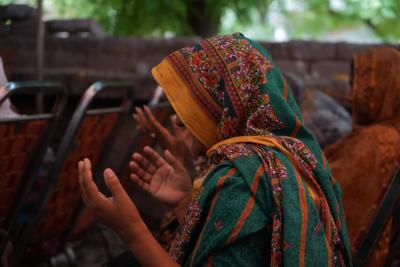A new approach to religious persecution

Persecution is widespread and ever-increasing. Around the world, millions of Christians are persecuted for their faith in Christ – men, women, and children. Apart from communal violence, harassment, and arbitrary detentions, believers in many parts of the world face extreme life-and-death situations resulting in churches desecrated, homes being burned down, mob violence, forced marriages of young girls, and even death.
Indeed, Open Doors International notes that almost 5,000 Christians were killed because of their faith just in the last year alone. Christians are suffering immensely, everywhere, every day.
And it is undeniably true: where Christians suffer at the hands of extremist groups or government regimes, their non-Christian neighbors are almost always suffering just as severely. This is not new. Evil in this world does not discriminate based on ethnicity, identity, location, or one’s religion. We see this point woven throughout Scripture (Eph. 6:12; John 16:33; 1 John 1:8; Matt. 13:38-39; Rom. 5:8). We have seen this throughout history. Large or small, remote or urban, old or young, communities affected by darkness can be of any race and any background because suffering has always been and will always be firmly rooted in sin.
Nigeria is arguably one of the most dangerous places to be a Christian right now, with a staggering 9 out of 10 religiously motivated murders in Sub-Saharan Africa taking place there. However, Islamist extremist groups like Boko Haram also target other Muslims who do not adhere to strict Sharia law, especially blasphemy laws. Similarly, in China, its Communist government continues to persecute Christian home churches, evangelicals, and even forbids children under 18 to attend church. At the same time, it is also a country marked by an ongoing genocide against the ethnoreligious Uyghur Muslims, whom the Chinese government literally seeks to eradicate (similarly targeting Tibetan Buddhists as well).
In Iran, Baha’is are severely persecuted alongside Christians, being denied their basic human rights because of their beliefs. In Pakistan, Christians suffer while Ahmadi Muslims are attacked for their faith, with repression increasing seemingly every year. And in other countries, while the persecution may not always be as overt as these examples, evil persists against people of all faiths.
For this reason, Christians Against All Persecution (CAAP Network) has taken a Biblical approach to “all” when it comes to persecution, advocating for every individual made in God’s image to be able to freely believe as their conscience leads and live out their faith without fear of violence. Time and time again, Christ teaches his disciples to love their neighbor as themselves and to help those who are in trouble. We are called to overcome socio-economic, gender, and ethnic barriers; to serve one another with the fullness of God’s love and mercy because of their inherent dignity and worth.
To truly live out the Great Commandment and Great Commission, it is not enough to evangelize or simply serve our own communities of fellow believers in need. While it is good and even necessary to our faith walk, it is not enough. Especially in our ever-diversifying world, our neighbors are no longer people who look, talk, and pray like us. They often do not share our belief in a triune God who sent His Son to die for our sins. This is true of those neighbors near and far. And though their faith may not be in Christ, they are nevertheless loved by their Creator who does not take the suffering of His creation lightly. As His Church, neither should we.
CAAP Network’s approach to combatting persecution is to stand beside our Christian and non-Christian neighbors suffering around the world. To engage with a hurting world, we must cross lines that could otherwise divide us (see Luke 10) and love, serve, advocate, and pray for anyone facing persecution without hesitation because to do so is to reflect Christ. As the Psalmist wrote, “The Lord is close to the brokenhearted and saves those who are crushed in spirit” (Psalms 34:18).
Advocating for someone’s right to believe is not advocating for the theology of that faith. Rather, it is affirming their Imago Dei and acting by a love that bears all things, endures all things, and takes no pleasure in evil, whomever that may implicate. (1 Cor. 13). As Paul stated, “If I have the gift of prophecy and can fathom all mysteries and all knowledge, and if I have absolute faith so as to move mountains, but have not love, I am nothing.”
With this mind and heart, Christians Against All Persecution, together with Dallas Baptist University’s Institute for Global Engagement and Pepperdine University’s Program on Global Faith and Inclusive Societies, will host “Praying for ALL the Persecuted: A Global Gathering” on October 24-25, 2024. Convened at the beautiful Dallas Baptist University, our goal is to inspire the church to pray and advocate for anyone facing persecution, regardless of beliefs. The global gathering will include an array of expert religious freedom advocates and leaders of Christian organizations who incorporate this mindset into their work, together with survivors of persecution from various faith backgrounds.
In closing, we are called to demonstrate love for our Christian brothers and sisters and to love our non-Christian neighbors. There is still time to register to attend “Praying for ALL the Persecuted: A Global Gathering.” Our goal is to leave with a fresh understanding and to be better equipped to pray and advocate in this suffering world. We are called. Join us!
Emily A. Cole is the Outreach Coordinator for the CAAP Network. A human rights attorney focused on Latin America, she is currently a researcher with Pepperdine University's Program on Global Faith and Inclusive Societies which centers on international religious freedom advocacy and promoting pluralism through sacred heritage sites.





















